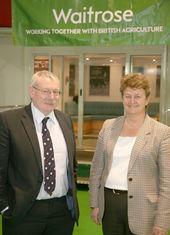
Waitrose is supporting the creation of an academic post dedicated to food security, the first of its kind in the UK, as part of its long-term commitment to UK agriculture.
The post of chair of Sustainable Agriculture at Aberystwyth University will spearhead vital research designed to help secure the UK’s food supplies over the next few decades.
The senior appointment, funded by Waitrose, will be based at Aberystwyth University’s Institute of Biological, Environmental and Rural Sciences(IBERS) and will contribute to the university’s ambition to establish IBERS as a driving force in using science to combat climate change and secure long-term food supplies.
Heather Jenkins, director of Agricultural Strategy at Waitrose, said: “The establishment of this chair reflects our long-term commitment to the future security of our food supply and to addressing the issue of climate change. This new role will spearhead vital research exploring how UK agriculture can be a solution to these pressing issues.”
Professor Wayne Powell, director of IBERS, said: “We are committed to rejuvenating agriculture in the UK and to supporting the sustainability of the rural economy through establishing links between farming communities, business and academics. The investment by Waitrose is a vote of confidence in supporting that goal. We are seeking to appoint a high-calibre individual as chair, who will play a pivotal role in realising the vision shared by Waitrose and IBERS. In particular, this post will focus on upland farming and will look at what is needed for the future when land utilisation in the UK will be of paramount importance.”
The UK agricultural industry is undergoing a period of substantial change as it addresses an increasing number of issues. In addition, animal and plant diseases are ongoing threats that farmers and growers will have to contend with in the future, coupled with food security issues and strains on productivity.
Professor Noel Lloyd, vice-chancellor of Aberystwyth University, said: “I warmly welcome this development, which is an excellent example of the key contribution that universities make to the economy and to policy development. We are committed to excellence and to establishing strong links with the users of research. The wide range of expertise in land-based science enables us to address major issues such as food security and the challenges of climate change.”



